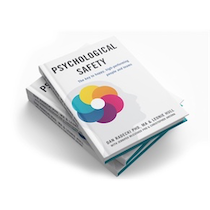The Great Resignation is a chance to build a competitive advantage
(If you know how)
The Great Resignation is upon us for many reasons. One of them is money, another is hope for more freedom, and still another is toxic work environments. The scale of this resignation is massive. According to the US Bureau of labor statistics, more than 4 million people resigned from their jobs last year. And the number is increasing. For example, if we compare February 2021 to February 2022, the number of resignations has increased from 3.4 million to nearly 4.4 million.1
When annualized, the Great Resignation accounts for about 3% of the US workforce! It puts an outsized burden on Human Resources and increases corporate costs for both training and workplace inefficiencies as the turnover hurts a company’s ability to operate, grow and remain profitable.
Thankfully, there is a light at the end of the tunnel for companies who consider Psychological S.A.F.E.T.Y.™ in their work ethic. For example, the data suggests that, though certain industries have naturally higher turnover than others, within most industries, some companies fare far better than others. The key ingredients of those reducing turnover during the Great Resignation include:
- Keeping the threat to their Security low by making employees feel their job is secure.
- Building on the Fairness and Trust triggers by making sure to be inclusive and making everyone feel part of the team.
- Building Esteem through recognition of individual successes, and giving support instead of punishments when employees make mistakes.
- Empowering employees by showing them the big picture goal and giving them the freedom to accomplish this goal in their own way within defined boundaries.
- Making sure promotions, raises, and bonuses are Fair and reflect the results a person achieved by avoiding favoritism.
Thanks to exit surveys and data collected through Psychological Safety and brain research, you can create a work environment that will reduce turnover compared to your competition. You can also leverage this information to address a second feature of the Great Resignation.
Recent reports show that while many are quitting their jobs, 1 in 5 people regret it later2. This statistic includes people who left for more money. If you can generate a workplace culture that includes Psychological S.A.F.E.T.Y.™ principles, you may actually be able to rehire your best previously trained employees, possibly for even for less money given that they will be starting over on their salary scale within your company, simply by creating a more desirable work atmosphere.
When employees look to perceived greener pastures, you will likely fight to retain them in your workforce as best you can. It might not work though. If you are unsuccessful, wish them well and let them know they have a place at the company if they are unhappy in their new gig. This is crucial. Do it with confidence knowing that you actually offer them the best working environment in your industry. Your demonstration of faith in their abilities and desire to retain them will plant a seed that will begin to grow as they walk out of your office.
Create a workplace culture that leverages Psychological S.A.F.E.T.Y.™ as a competitive advantage can reduce turnover during this tumultuous time, prevent brain-drain, and maintain efficiency. It can act as a recruitment tool for other top talent and can even bring your better experienced people back to you once they discover that the greener pasture was not greener at all – building stronger loyalty in the long run.










